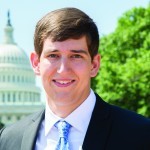 At the recent National Prayer Breakfast, President Trump expressed his desire to repeal the Johnson Amendment and “allow our representatives of faith to speak freely.” He was heard on the campaign trail saying that he would give pastors back their voice in the political sphere. This is both frightening and problematic on several levels.
At the recent National Prayer Breakfast, President Trump expressed his desire to repeal the Johnson Amendment and “allow our representatives of faith to speak freely.” He was heard on the campaign trail saying that he would give pastors back their voice in the political sphere. This is both frightening and problematic on several levels.
At the most obvious level, this statement flies in the face of the First Amendment to the Constitution and its claim that “Congress shall make no law respecting an establishment of religion, or prohibiting the free exercise thereof.” The government is not in the business of religion, and religious institutions are not in the business of governing. The government cannot tell a church how to administer the Lord’s Supper, and the church cannot endorse a candidate for public office. In his letter to the Danbury Baptist Association, Thomas Jefferson spoke of this sort of arrangement as a wall of separation put in place between church and state. Sure, this wall is porous and difficult to define, but in the end, it is good for both sides. When this separation is protected, the government cannot be seen as privileging one religious tradition over another, and the church does not lose its prophetic voice.
At a deeper level, this is dangerous, particularly when one considers a dark time in America’s past when churches crossed this line all too frequently. I am, of course, thinking of the political involvement of Southern churchmen (unfortunately, particularly Southern Baptists), in the years preceding, during and following the Civil War. The formation of the Southern Baptist Convention was a religious legitimization of a political position on slavery. Early documents of the SBC show unabashed support of the Confederacy and the Southern cause, despite their own claims to adhere to the biblical command “to render unto Caesar what is Caesar’s.” Days were designated for fasting and prayer for Jefferson Davis and the Confederate war effort. This support of Southern norms continued even in the years following the war as churches supported the practices of Jim Crow, mirroring them and legitimizing them in their own congregations. This was a blatant erasure of the demarcation between church and state. It was a loss of the church’s prophetic voice as they willingly entered into servitude of a secular ideology.
John Lee Eighmy terms this as the descent into a state of “cultural captivity.” Churches and pastors in the South were no longer in a position to criticize wrongdoings of the world. They could not be the voice of reason society needed. They were captive to the ideals of society rather than Christian conviction. The church had sacrificed its prophetic voice for the sake of political gain. While this is obviously a radical comparison, it is an informative one. Repeal of the Johnson Amendment may appear to be a small step, and some may argue that churches already involve themselves in politics and nothing will actually change, but such a change in the law sets a dangerous precedent and represents the beginning of the descent down a slippery slope.
As Baptists, we are a part of a long tradition of commitment to religious liberty for all. We have heard time and again the story of Roger Williams’ efforts to protect the liberty of conscience for all, whether they were Christian or not. He surely would have opposed the endorsement of candidates or legislation from the pulpit. Freedom from deep political involvement is necessary for the preservation of the church’s ability to speak prophetically with any legitimacy. We must protect this at all costs, lest we find ourselves once again in a state of cultural captivity.
Related story:
Head of Baptist advocacy group says Johnson Amendment good for churches
